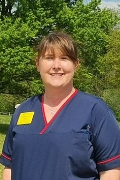On May 20th, 2020 the law around organ and tissue donation in England changed, moving to an opt-out system. This change opens up many questions for health care professionals, particularly those looking after patients at the end of life. This presentation helps nurses understand what tissue donation is, their responsibilities in relation to the legislation, and how they can ensure tissue donation is incorporated into everyday practice.
I first developed my interest in organ and tissue donation when I worked in Critical Care. I was particularly interested in end of life care in critical care and saw first-hand how and organ and tissue donation could bring hope and purpose to bereaved families. In 2010 I joined NHS Blood and Transplant (NHSBT), initially as a Specialist Nurse Organ Donation and then in 2016 as a Regional Nurse Specialist in Tissue Donation.
I feel very privileged to be part of an amazing team of nurses and be instrumental in supporting so many families through the donation process. Every year around 4,500 corneas are used to improve the vision and restore the sight in patients who would otherwise face blindness. Many others benefit from life changing surgery due to the selfless generosity of our donors. I know that these families have gained great comfort from knowing that the death of their loved one has not been in vain and that donation has transformed the lives of so many patients whose lives were on hold waiting for a transplant.
On May 20th 2020, the law around organ and tissue donation in England changed, moving to an opt-out system. Despite this there remains an acute shortage of suitable tissue donors, and many people are waiting longer for the surgeries that will transform their lives. We are still reliant on Health care professionals having discussions with patients and their families around donation and sadly many patients who could donate are being denied the opportunity to do so.
Unlike organ donation, tissue donors do not have to die in a hospital setting. Many healthcare professionals are unaware that patients reaching the end of life, may still be able to donate tissue after their death, even if they are elderly or have pre-existing medical conditions. The law change is an opportunity to save and improve even more lives and this presentation aims to break down some of the myths around tissue donation and empower nurses to incorporate this into everyday practice.
Further resources
- Winstanley E, Carroll V, Mander G, Atkinson D and Gallagher R, (2020) NHSBT Tissue and Eye Services: nursing roles and responsibilities British Journal of Nursing, 2020, Vol 29, No 6: 374-375
- Lawlor M and Kerridge I (2014) Understanding selective refusal of eye donation: identity, beauty and interpersonal relationships. Bioethical inquiry, 11: 57-64
- Long-Sutehall T, Winstanley E, Clarkson AJ and Sque M. (2011) Evaluation of the experiences of family members whose deceased relative donated tissues at the NHSBT dedicated donation facility in Speke, Liverpool. Cell Tissue Bank, 13: 537–546
- Muraine M, Toubeau D, Menguy E and Brasseur G. (2002) Analysing the various obstacles to cornea post-mortem procurement. British Journal of Ophthalmology, 86: 864-868
- Royal College of Nursing. Advanced level nursing practice: introduction. London: RCN; 2018 Sque M, Long T, Payne S, Allardyce D. Why relatives do not donate organs for transplants: ‘sacrifice’ or ‘gift of life’? J Adv Nurs. 2008;61(2):134–144
- Sque M, Walker W, Long–Sutehall T, Morgan M, Randhawa G, Rodney A. Bereaved donor families’ experiences of organ and tissue donation, and perceived influences on their decision making. J Crit Care. 2018;45:82–89
- Siminoff LA, Traino HM, Gordon N. Determinants of family consent to tissue donation. J Trauma. 2010;69(4):956–963.







 Share on LinkedIn
Share on LinkedIn




